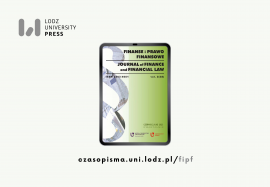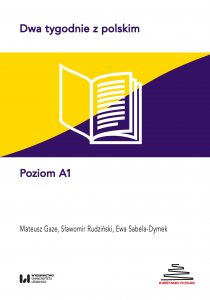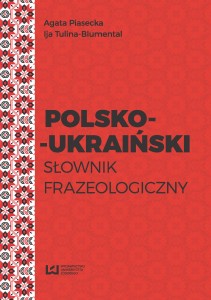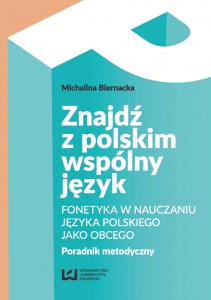Journal of Finance and Financial Law | Tom 2, Nr 38 (2023)
Opublikowano: 6 lipca 2023

Kwartalnik Journal of Finance and Financial Law jest recenzowanym czasopismem naukowym, w którym zamieszczane są oryginalne artykuły naukowe, często łączące teorię z praktyką, odnoszące się do finansów oraz powiązanych z nimi dziedzin. Łamy czasopisma są otwarte również dla przedstawicieli nauk prawnych, którzy podejmują tematykę regulacji finansowych.
Celem czasopisma jest promowanie i publikowanie wyników badań z zakresu finansów, inspirowanie autorów, a także czytelników, do lepszego zrozumienia, zdefiniowania i wyjaśniania ważnych, w szczególności bieżących zjawisk oraz mechanizmów finansowych. Zadaniem czasopisma jest: udostępnienie forum do upowszechniania rezultatów badań oraz wymiany opinii, prezentacja indywidualnych i zespołowych dokonań naukowych.
Redakcja prowadzi stały nabór artykułów do czasopisma Finanse i Prawo Finansowe.
Artykułowi opublikowanemu w czasopiśmie Finanse i Prawo Finansowe przyznawane jest 40 pkt. (MEiN, grudzień 2021).
Czynniki wpływające na kondycję finansową na przykładzie przedsiębiorstw notowanych na GPW
Monika Bolek, Agata Gniadkowska-Szymańska
Cel artykułu/hipoteza: Celem niniejszego artykułu jest ocena kondycji spółek na rynku kapitałowym, która jest ważną informacją dla interesariuszy, w tym inwestorów i menedżerów.
Metodyka: W niniejszym opracowaniu jako zmienną, na którą mogą wpływać strategie odzwierciedlone w poziomach wskaźników finansowych, zaproponowano miarę sytuacji finansowej firmy opartą na Z-Score Altmana, współczynniku wzrostu Q Tobina i EPS. Artykuł przedstawia nowe podejście do sposobu oceny kondycji finansowej.
Wyniki/Rezultaty badania: Na podstawie analizy danych stwierdzono, że sytuacja firm związana z 3-letnim wzrostem EPS, prawdopodobieństwem upadłości i potencjałem wzrostu jest ujemnie determinowana przez sumę aktywów i dodatnią rentowność aktywów. Kondycję spółek związaną z 5-letnim wzrostem EPS, prawdopodobieństwem upadłości i potencjałem wzrostu determinuje w pozytywny sposób struktura kapitałowa i zwrot z kapitału. Wzrost krótkoterminowy jest więc determinowany przez zarządzanie aktywami, a wzrost długoterminowy przez optymalizację struktury kapitału. Ponadto stwierdzono, że istnieją różnice pomiędzy firmami w dobrej i słabej kondycji pod względem wdrażanych strategii.
Credit Holidays” – Origins and Cost-effectiveness Analysis of Use by Eligible Borrowers Using Selected Examples
Marcin Borys
The occurrence of negative phenomena over the past two years: the Covid-19 pandemic, the temporary disruption of supply chains, the war in Ukraine and the energy crisis has affected many aspects of the global economy, including the rise in inflation and interest rates. All borrowers, including more than two million households in Poland repaying home loans, have been affected by these changes – most notably visible in the dynamic increase in lending rates. In order to help borrowers repay the instalments of such loans granted in zloty, the Legislator introduced legislation in July 2022 allowing for the use of „credit holidays”. The purpose of this article is to present the results of a study carried out on the basis of sample home loans – the impact of the introduction of „credit holidays” on the level of loan principal and instalments, assuming that all the money saved from the suspension of instalments is used to overpay the loan.
Assessment of the Effects of the COVID-19 Pandemic in the HoReCa Industry in the Opinion of Customers and Employees
Joanna Cichorska, Katarzyna Zielina
The purpose of the article/hypothesis: The COVID-19 pandemic and imposed restrictions negatively affected the economy and social life. Their effects were particularly hard for the HoReCa industry, i.e. the hotel and catering industry. The purpose of the article is an analysis of the activities of the hotel and catering industry in the conditions of the coronavirus pandemic. The article uses questionnaire surveys on a sample of owners, employees and consumers of the hotel and catering industry in Poland in the years 2020–2021. A total of 164 respondents took part in the study. Three independent surveys were conducted. In the part concerning consumers, 144 respondents took part in the survey, including 111 women and 33 men. The majority of the respondents were people aged 16–24 – 69 people (47,9%), 52 people were in the range of 25–40 years (36,1%), 16 people (11,1%) were from the age group of 41–55, and the remaining 7 people were aged over 55 (4,9%). Most of the respondents were people with secondary education, 74 people (51,4%). Higher education was declared by 51 people (35,4%), vocational education by 9 people (6,3%) and primary education by 10 people (6,9%).
20 respondents – business entities – responded to the study of the impact of the COVID-19 pandemic on the HoReCa industry from the perspective of a manager. They were mostly people running a restaurant (55%), a hotel (40%) and a restaurant with a predominant catering activity (20%). The respondents represented facilities in various voivodships, however, the largest number of people managed facilities in the Śląskie (35%) and Małopolskie (25%) voivodships. Radical restrictions resulted in significant scaling down of hotel and restaurant activity. As a result of the decline in consumption in tourist services, the value of sales revenues and the profitability of the HoReCa industry decreased. In the group of employees, the most burdensome effects of the pandemic included reduction in employment, compulsory holidays and the lack of comfort at work. However, a pandemic with many negative economic and social consequences may also have positive long-term effects. Paradoxically, unfavorable circumstances forced entrepreneurs to look for alternative solutions to maintain financial liquidity and to survive in the industry.
The subject of the article is an analysis of the activities of the hotel and catering industry in the conditions of the coronavirus pandemic. Its purpose is to assess the impact of the pandemic on employees and consumers of the HoReCa industry.
In accordance with the goals defined in this paper, the following hypotheses were formulated:
- The imposed restrictions and above all, closing of the premises, contributed to a significant decrease in consumption in the HoReCa industry and prevented the development of many enterprises, and the effects of the stagnation will be felt for a long time both by employees and consumers.
- In many companies in the HoReCa industry, the level of sales revenues decreased, led to a loss of profitability.
- The negative effects of the Covid-19 pandemic were felt by all stakeholder groups in the HoReCa industry, including: a. employers – loss of income; b. employees – loss of job and inconvenience of work due to the obligation to maintain specific hygiene conditions; c. customers – closing the premises, obligation to keep social distance.
In connection with these theses, the first part of the article discusses the social consequences of the COVID-19 pandemic. In this section, the authors used original reports, including those of the WHO. The next section presents the opinion of employees and owners of hotels and catering establishments on the impact of the pandemic on working conditions and income. The last part presents the clients’ feelings about the HoReCa sector as regards the level and availability of services. For this purpose questionnaire surveys were used on a sample of owners, employees and clients of the hotel and catering industry in Poland in the years 2020–2021.
The undertaken research problem is very important due to a large scale of restrictions that affected the HoReCa industry during the pandemic and resulted in related financial losses.
Methodology: Analysis of the environment of the HoReCa sector along with its foreseeable evolution has been carried out using intelligence techniques such as the identification and analysis of government public sources and reports about behavior of consumers and market trends, published by consulting companies and public research institutes. The use of quality secondary information sources instead of the primary ones does not imply a decrease in the scientific validity of a study when the principle of strategic intelligence of never accepting a single information authority is respected. The method of competitive intelligence consists of the collection, transmission, analysis, and dissemination of relevant information publicly available and legally obtained, to produce actionable knowledge for the improvement of the decision making process.
The assessment of the financial situation of the HoReCa industry was presented on the basis of eight selected companies listed on the Warsaw Stock Exchange, including three largest hotel chains in Poland. Additionally, this method has been supplemented with a questionnaire survey applied to HoReCa sector users and experts, conducted during the pandemic in Poland in 2020 and 2021. The survey was quasi-representative, i.e. the sample meets the requirements of the representative method in some respects. The study was conducted using the direct interview method. Respondents were asked single choice and multiple choice questions.
The survey was conducted in three areas: HoReCa service clients, industry employees and hotel and restaurant owners. Three independent surveys were conducted, in which 164 respondent participated.
Results of the research: The observations and opinions of respondents contained in the surveys were used to formulate conclusions about the future and the necessary changes in the provision of HoReCa services.
A. The analysis of financial statements of selected HoReCa companies made it possible to state that the restrictions imposed in the pandemic resulted in lower sales revenues and lower profitability, especially in the smallest hotels.
B. The survey conducted in the group of hotel owners shows that the decrease in profitability in the HoReCa industry was mainly due to the closure of hotels and the ban on the operation of stationary catering establishments. The owners expressed an opinion that the state aid was insufficient to cover the losses related to the pandemic.
C. Surveys in the group of employees showed that the pandemic resulted in a reduction in employment and a deterioration of work comfort in HoReCa facilities. .
D. The surveyed guests confirmed that during the pandemic, they mostly used catering and take-away services. They most willingly spent their holidays in summer houses, which enabled them to maintain social distancing.
Zróżnicowanie publicznych wydatków na ochronę zdrowia w krajach członkowskich Unii Europejskiej
Julia Frączek
Cel artykułu/hipoteza: Celem artykułu jest analiza poziomu publicznych (rządowych) nakładów na ochronę zdrowia w poszczególnych krajach Unii Europejskiej. Badania mają charakter eksploracyjny w związku z czym nie sformułowano hipotezy badawczej.
Metodyka: Przeprowadzono analizę porównawczą, poziomu publicznych nakładów na ochronę zdrowia w poszczególnych krajach Unii Europejskiej, na podstawie następujących mierników pochodzących z Eurostatu: publiczne wydatki na ochronę zdrowia jako wartość EUR na osobę w latach 2011–2020 oraz publiczne wydatki na ochronę zdrowia jako % PKB w latach 2011–2020.
Wyniki/Rezultaty badania: W poszczególnych krajach Unii Europejskiej, które można uznać za podobne kulturowo i gospodarczo, występują znaczne różnice w poziomie publicznych nakładów na ochronę zdrowia. W zdecydowanej większości krajów Unii Europejskiej zaobserwowano wzrost nakładów na ochronę zdrowia. Zmiany te są bardzo zróżnicowane w poszczególnych krajach co powoduje, że powiększa się dystans pomiędzy niektórymi krajami (np. Polską), w których zmiany przebiegają wolniej, a innymi krajami Unii Europejskiej. Tworząc ranking krajów Unii Europejskiej pod względem nakładów na ochronę zdrowia można zauważyć względnie stałe pozycje krajów na przestrzeni lat 2011-2020. Najwyższe pozycje zajmują kraje Europy Zachodniej, a te niższe kraje Europy Środkowo-Wschodniej. Przeprowadzona analiza pozwala na stwierdzenie, że pozycja Polski na tle pozostałych krajów Unii Europejskiej w zakresie publicznych nakładów na ochronę zdrowia jest niska – dotyczy to nie tylko porównania Polski z rozwiniętymi krajami Europy Zachodniej, ale także z większością krajów Europy Środkowo-Wschodniej.
Wpływ pandemii COVID-19 na sposób korzystania z usług bankowych oraz na postrzeganie banków w Polsce – na podstawie badania empirycznego
Justyna Rybacka
Celem głównym artykułu była identyfikacja zmiany sposobów korzystania z usług bankowych przed, jak i w trakcie pandemii COVID-19 oraz weryfikacja tego, jak konsumenci postrzegają współcześnie instytucje bankowe. W artykule sformułowano dwie hipotezy. Pierwsza odnosi się do tego, że klienci banków przeszli w znaczącej części na zdalne formy korzystania z usług bankowych w okresie koronawirusa. Z kolei druga teza odwołuje się do tego, iż wykorzystanie bankowości internetowej spowodowało, że jej użytkownicy przywiązują większą uwagę do aspektu bezpieczeństwa niż przed pandemią.
Na potrzeby niniejszego opracowania przygotowano i przeprowadzono badanie empiryczne. Podstawowym celem badania była identyfikacja zmian w korzystaniu z usług bankowych w okresie koronawirusa oraz weryfikacja postrzegania wizerunku banków w dobie ostatnich wydarzeń ekonomiczno-społecznych. Badanie przeprowadzono metodą ankietową, w której wykorzystywany był kwestionariusz ankiety.
Na podstawie przeprowadzonego badania można zauważyć, że głównie osoby po 50 roku życia przeniosły się na zdalna formę kontaktu z bankiem na skutek pandemii. We wskazanej grupie wiekowej w początkowej fazie koronawirusa popularność zyskała bankowość mobilna. Przed pandemią 26% ankietowanych deklarowało, że odbywało wizyty w banku w celu wpłaty lub wypłaty środków z rachunku bankowego. W trakcie pandemii tylko już 1% badanych deklarował, że odbywał bezpośrednie spotkanie z doradcą bankowym w celu skorzystania z usług bankowych. 33% respondentów stwierdziło, że zmiana sposobu korzystania z oferty banku pozwoliła oszczędzić im czas, a 12% wskazało, że powodem zmiany była obawa o zdrowie i życie. Na uwagę zasługuje fakt, że aż 42% ankietowanych wskazało, że po pandemii COVID-19 zwróciło większą uwagę na bezpieczeństwo w sieci. Wzrost cyfryzacji wśród społeczeństwa przełożył się na wzrost świadomości w kwestii przestępstw finansowych popełnianych w Internecie.
Impact of COVID-19 on the Daily Returns of Istanbul Stock Exchange
Burcu Zengin, Sahnaz Kocoglu
The purpose of the article/hypothesis: The measures taken by the governments to fight Covid-19 such as social distancing and lockdowns not only crippled the social life, but also the economies of their countries. The purpose of this paper is to analyze the impact of the Covid-19 pandemic on the Turkish economy. The authors used the Istanbul Stock Exchange Index which is a sort of barometer to measure the health of the economic and financial system in Turkey. The aim of the paper is to show the impact of Covid-19 together with the risk in the global market, exchange rates and government responses to the pandemic on the Istanbul Stock Exchange.
Methodology: The authors analyzed the impact of the pandemic studying the relations between the Istanbul Exchange and a number of deaths due to Covid-19 together with VIX index, the Government Response Index and exchange rate of USA dollar/Turkish Lira with Toda-Yamamoto Causality test.
Results of the research: The results suggest that the number of deaths due to Covid-19 and exchange rates cause the loss in value in the Istanbul Stock Exchange while VIX index and the Government Response Index are found to be ineffective in explaining the volatility in the ISE.
Dodatek kwartalny
Zuzanna Pakuła, Anna Peruga, Radosław Witczak, Artur Zimny
Komentarze
Ten post dostępny jest także w języku: angielski





